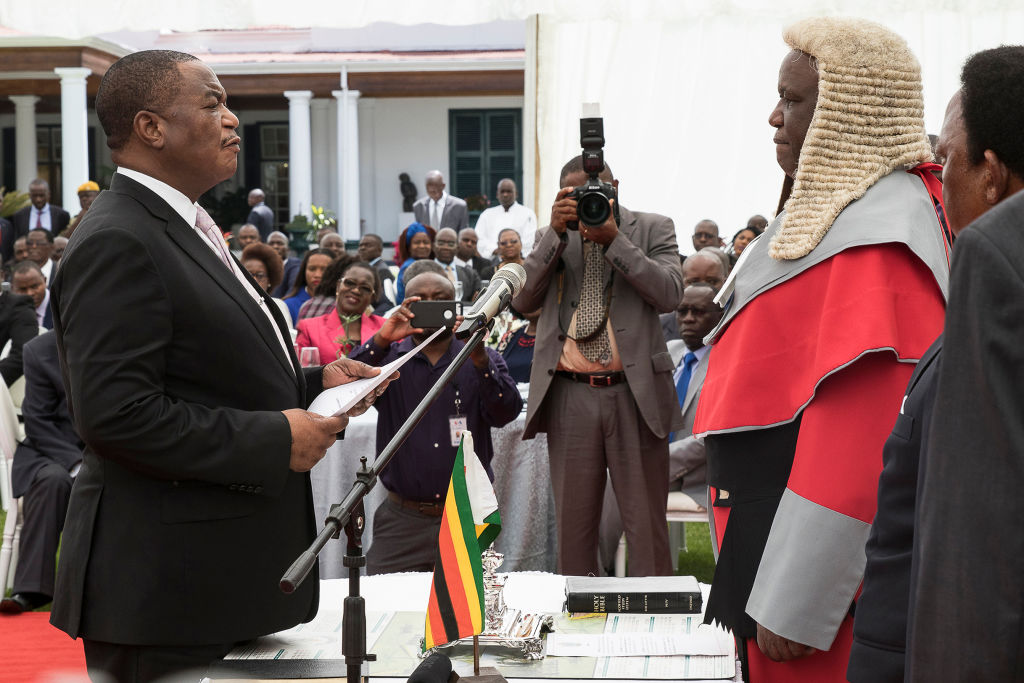Zimbabwe, a country currently experiencing an economic crisis, has come under fire from its citizens for spending over $150,000 to purchase "traditional" English blonde wigs for its judges.
The Zimbabwe Independent reports the country's Judiciary Service Commission placed 64 orders for the hair accessories. The particular request was made to London specialty shop Stanley Ley Legal Outfitters, where the wigs were crafted by hand "using traditional methods unchanged over centuries," according to its site.
The New York Daily News reports each powdered wig, varying in style, costs between $1,490 and $2,800.
The country, recently devastated by the recent cyclone that took over 250 lives and displaced nearly 200,000 persons, was already suffering from a financial crisis, as Blavity reported.
The country had reportedly been entrenched in a political debate about the wigs when the delivery was finalized and reported. Some judges support the tradition while others deem it an outdated colonial relic.
Either way, citizens appear enraged, taking to social media to voice their frustrations not only due to the unnecessarily extreme money expenditure but also the "hideous" wigs themselves.
Director of Africa’s International Commission of Jurists Arnold Tsunga voiced his disapproval of the judicial attire, writing, "The judicial wig (colonial) tradition continues in #Zimbabwe with all its costs and controversy without any meaningful benefit to access to justice."
“The conditions in Zimbabwe’s courts are dire and yet they can find money for wigs costing thousands of pounds — it’s obnoxious,” Tsunga said to The Times.
The judicial wig (colonial) tradition continues in #Zimbabwe with all its costs and controversy without any meaningful benefit to access to justice. https://t.co/LOl0CUyJlI
— ARNOLD TSUNGA (@tsunga_arnold) March 29, 2019
Others seem to echo the sentiment.
Even the former colonial power is having a laugh at us saying that, “…You can take Zimbabwe out of the Empire but you can't take the Empire out of Zimbabwe.”
"The chief justice, Luke Malaba, a war veteran, is among the keenest wig wearers on the bench." https://t.co/E6fsy6PESR— Hopewell Chin'ono (@daddyhope) April 2, 2019
Hopewell Chin'ono, a Zimbabwean journalist, alludes to the fact that Britain doesn't even wear the wigs and robe as religiously anymore. Instead, the wigs are only required during criminal cases. The reform came down in 2008, ending centuries of the custom.
Zimbabwean judges wear both traditional wigs and gowns daily in court.
Use white/ Black scarves! Or, dye your hair white & if u dont have hair, paint your skull! Better still, paint your face red and white before proceedings in court. 4k White Wigs!
Zimbabwe blasted for spending thousands of dollars on wigs https://t.co/XQS6uBTbMV via @MailOnline
— O.A.U. Gadi (@HermattanLLC) April 5, 2019
If judges are to wear wigs let them be big afro wigs. #outoftouch
#irrelevant
#zimbabwe
#judiciary
https://t.co/9ZMUeqXSLb— Fungai Tichawangana (@fungaiafrica) April 5, 2019
Most Zimbabwe and black women wear WIGS. I guess we shouldnalso blame these institutions for teaching us there is something inherently wrong with our African hair ????
— AndyKa1 (@Andy17423021) April 4, 2019
Zimbabwe may be on their knees financially. But their senior judges must have their British handmade horsehair powdered wigs. – at £2,000 each!
— George Hepburn (@hebbiedodds) April 3, 2019
How are we still following old trends by wasting tax payers money on wigs .While doctors are begging for painkillers to save lives ,while people are still devastated by cyclone idal.Lack of priorities,we need a legitimate dialogue because this is pathetic.Cry Zimbabwe cry https://t.co/d1r3PxJfMO
— THE LONG WALK TO FREEDOM (@langtondee2010) April 2, 2019
Still, the debate continues as senior government officials, such as Chief Justice Luke Malaba, assert that the tradition should continue.
Face2Face Africa reports that many lawyers are against the dress code but do not hold enough weight or power to change it.
“A lot of Zimbabwe’s institutions are mentally stuck in the past," said Zimbabwean lawyer Lloyd Masipa. "We fought against the British for our freedom and yet now impose on ourselves many traditions that even the British no longer always observe.”
“I have argued here that this country suffers from a catastrophic mismanagement of resources,” Chin’ono added later. “How do you explain a government allocating $155,000 for wigs to be bought in England when the same government is failing to buy bandages and betadine for infants in pediatric wards?”
On last year's Global Hunger Index, Zimbabwe ranked at 107 out of 119 countries, with nearly 72% of its citizens living in poverty.
Now, check these out:
Death Toll For Cyclone Idai, Which Struck Mozambique, Zimbabwe And Malawi, Reaches 750
Beyoncé Reportedly Walked Out Of A Meeting With Reebok Because Their Diversity Wasn't In Formation
America's Largest Black-Owned Bank Is Launching A Line Of Debit Cards Featuring Revered Black Women
